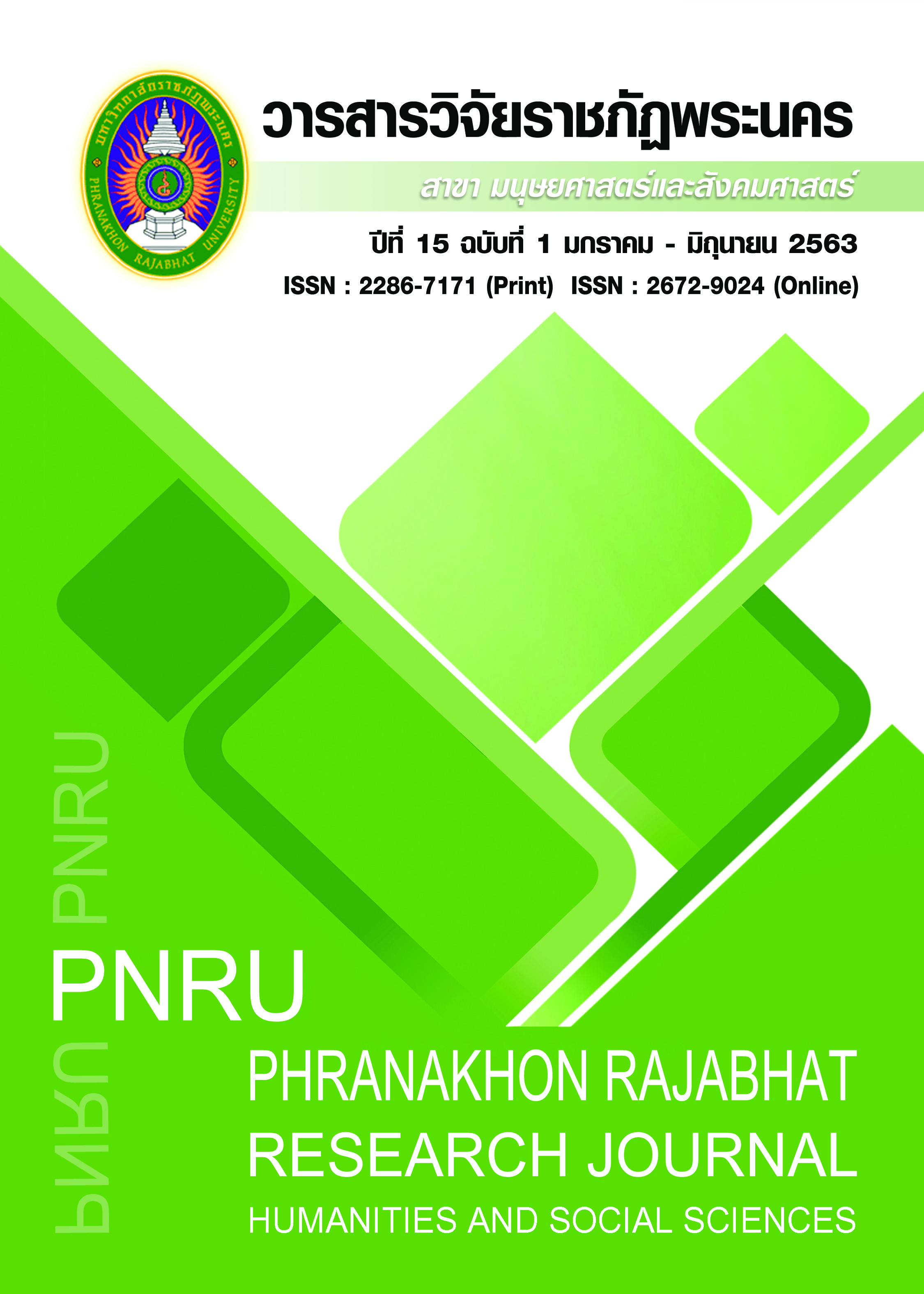ความสุขของแรงงานไทย: การวิเคราะห์คุณค่าการจัดการครอบครัวในการสนับสนุนด้าน ทรัพยากร (การเงิน และความรู้) สุขภาพ และอารมณ์
Main Article Content
บทคัดย่อ
การที่แรงงานจะสามารถทำงานได้อย่างมีคุณภาพต้องอาศัยปัจจัยสนับสนุนจากจุดเริ่มต้นคือครอบครัวและตามมาด้วย องค์การที่ทำงาน ทั้งนี้เพื่อให้เกิดดุลยภาพงานและชีวิตที่เหมาะสม ดังนั้นการบริหารทุนมนุษย์ขององค์การจึงทำความเข้าใจและบริหารแรงงานที่ตอบสนองไปถึงครอบครัวของแรงงาน ด้วยเหตุผลนี้จึงนำมาสู่การศึกษาครั้งนี้โดยมีวัตถุประสงค์เพื่อศึกษาปัจจัยที่สนับสนุนจากครอบครัวใน 3 ด้าน คือ ด้านทรัพยากร ด้านสุขภาพ และด้านอารมณ์ที่มีอิทธิพลต่อความสุขของแรงงานไทย โดยมีปัจจัยคั่นกลางคือ การจัดการด้านดุลยภาพงานและครอบครัว การศึกษาใช้ขนาดตัวอย่าง 300 คน จากหัวหน้าครัวเรือนที่ทำงานในอุตสาหกรรมค้าปลีกในกรุงเทพมหานคร และใช้แผนการสุ่มตัวอย่างแบบหลายขั้นตอน ผลการศึกษาพบว่า ปัจจัยการแบ่งปันด้านอารมณ์เป็นจุดแข็งในการจัดการของครอบครัวไทย ส่วนอีกสองปัจจัย คือ ด้านทรัพยากร (การเงินและความรู้) และด้านสุขภาพมีอิทธิพลเชิงบวกแต่ยังไม่มีนัยสำคัญ ดังนั้นองค์การจึงควรกำหนดนโยบายในการสนับสนุนให้พนักงานมีความสามารถเพิ่มรายได้และมีการจัดการทางการเงินที่ดี เช่น การทำบัญชีในครัวเรือน การส่งเสริมความรู้ด้านสุขภาพ ซึ่งเป็นพื้นฐานของความสุขในครัวเรือนอันนำไปสู่ทรัพยากรที่ดีขององค์การคือ การมีพนักงานที่มีความสุขในการทำงานอย่างมีประสิทธิภาพ
Article Details
บทความที่ได้รับการตีพิมพ์เป็นลิขสิทธิ์ของมหาวิทยาลัยราชภัฏพระนคร
ข้อความที่ปรากฏในบทความแต่ละเรื่องในวารสารวิจัยราชภัฏพระนครเล่มนี้เป็นความคิดเห็นส่วนตัวของผู้เขียนแต่ละท่านไม่เกี่ยวข้องกับมหาวิทยาลัยราชภัฏพระนคร และคณาจารย์ท่านอื่นๆในมหาวิทยาลัยฯ แต่อย่างใด ความรับผิดชอบองค์ประกอบทั้งหมดของบทความแต่ละเรื่องเป็นของผู้เขียนแต่ละท่าน หากมีความผิดพลาดใดๆ ผู้เขียนแต่ละท่านจะรับผิดชอบบทความของตนเองแต่ผู้เดียว
References
Aaron, C. & Ronit, G. (2007). Prediction absenteeism and turnover intentions by past absenteeism and work attitudes. Career Development International, 12(5), 416-432.
Armstrong-Stassen, M. & Cameron, S. (2005). Factors related to the career satisfaction of older managerial and professional women. Career Development International, 10(3), 203-15.
Boonchokcharoensri, S. (2015). Work environment, job characteristics and supervisors’ factors influence employee engagement in Bangkok. Master’s degree in business, Bangkok University. (in Thai)
Dew, J. P. (2007). Two sides of the same coin? The differing roles of assets and consumer debt in marriage. Journal of Family and Economics issues, 28, 89-104.
Eby, L., Casper, W., Lockwood, A., Bordeaux, C., & Brinley, A. (2005). Work and family research in IO/OB: Content analysis and review of the literature (1980-2002). Journal of Vocational Behavior, 66(1), 124-197.
Glass, J. & Finley, A. (2002). Coverage and effectiveness of family-responsive workplace policies. Human Resource Management Review, 12(3), 313-337.
Gray, R. (2012). Physical health and mental illness: A silent scandal. International Journal of Mental Health Nursing, 21, 13-22.
Greenhaus, J. & Beutell, N. (1985). Source of conflict between work and family roles. The Academy of Management Review, 10, 76-88.
Greenhaus, J. & Powell, G. (2006). When work and family are allies: a theory of work-family enrichment. The Academy of Management Review, 31, 72-92.
Hibbert, J.R. & Beutler, I. F. (2001). The effects of financial behaviors on the quality of family life: Evidence from adolescent perceptions. Annual association for financial counseling. Orlando.
Kim, J. & Ling, C. (2001). Work-family conflict of women entrepreneurs in Singapore. Women in Management Review, 16(5), 204-221.
Lapierre, M. & Allen, D. (2006). Work-supportive family, family-supportive supervision, use of organizational benefits, and problem-focused coping: implications for work-family conflict and employee well-being. Journal of Occupational Health Psychology, 11(2), 169-181.
Lim, N. (2016). Cultural differences in emotion: differences in emotional arousal level between the East and the West. Integrative Medicine Research, 5, 105-109.
Lobos, G. et al. (2016). In the choice between health and money. Cad. Saude Public, 32(5), 1-12.
Ribeiro, J. & Galinha, I. (2012). Cognitive, affective and contextual predictors of subjective wellbeing. International Journal of Wellbeing, 2(1), 34-53.
Phengnaren, P. (2004). Factor related to the organization commitment of automobile company employees. Mahidol university. (in Thai)
Pianthong, K., Sarakan, K. & Aksornwong, R. (2017). A factor analysis of work life balance of psychiatric nurses, 31(2), 109-119. (in Thai)
Pongatichat, P. (2007). Work life balance: True stories or just fiction. Journal of Civil servant, 51, 45-50. (in Thai)
Sangsawang, P. (2002). Emotion, Mind and Buddhism. Academic Services Journal. Songkla university, 13(3), 20-35. (in Thai)
Voydanoff, P. (1990). Economic distress and family relations: A review of the eighties. Journal of Marriage and the family, 52, 1099-1115.
Voydanoff, P. (2005). Toward a conceptualization of perceived work family fit and balance: a demand and resources approach. Journal of Marital status and Family, 67, 822- 836.

